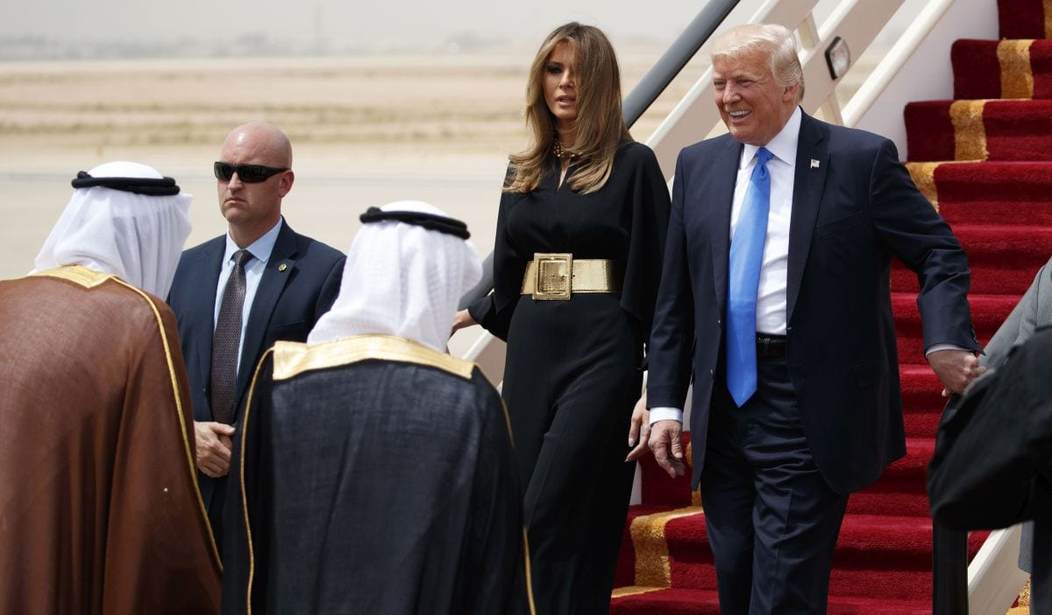President Trump touched down in Saudi Arabia Saturday on his first foreign trip that will see him visiting, in addition to Saudi Arabia, Israel, Vatican City, Belgium, and Italy.
But the president’s visit will start off with a bang—the formal announcement of a massive $110 billion arms deal with the Kingdom that could become a $350 billion agreement that stretches out over 10 years.
The Saudis will get some of the latest, most technologically advanced hardware in the American arsenal, including “tanks, artillery, helicopters, armored carriers, combat ships, and an assortment of other advanced weapons systems.”
The agreement, which is worth $350 billion over 10 years and $110 billion that will take effect immediately, was hailed by the White House as “a significant expansion of…[the] security relationship” between the two countries. It represents an enhancement of Saudi Arabia’s military capabilities as tensions flare in the region, with the U.S. viewing the Saudis as a linchpin in efforts to check the global ambitions of Iran.
“This package of defense equipment and services support the long-term security of Saudi Arabia and the Gulf region in the face of Iranian threats, while also bolstering the Kingdom’s ability to contribute to counter terrorism operations across the region, reducing the burden on the U.S. military to conduct those operations,” the White House said in a statement.
For the Saudis, Trump’s visit represents a diplomatic and public relations coup for Mohammed bin Salman, the Kingdom’s 31-year old deputy crown prince. The U.S.-Saudi partnership has been fraught with controversy since the Sept. 11 attacks, which culminated last year in a Congressional vote to allow 9/11 families to sue the country for its suspected links to the attackers.
Saudi Arabia is the primary destination for U.S. arms sales, according to the Council on Foreign Relations, with the Kingdom purchasing nearly 10 percent of U.S. exports from 2011 to 2015.
The weapons deal also gives Trump — who sold himself to voters as an inveterate deal maker —a victory to merchandise abroad, just as his political pressures intensify at home. Over the course of the last week, the White House has been overwhelmed by news stemming from an inquiry into the Trump campaign’s alleged links to Russia, and the abrupt dismissal of former FBI Director James Comey.
Human rights groups are claiming the deal is illegal because of the Saudi war with Houthi rebels in Yemen.
Citing “multiple credible reports of recurring and highly questionable [air]strikes’’ by the Saudi military that have killed civilians, the U.S. “cannot continue to rely on Saudi assurances that it will comply with international law and agreements concerning the use of U.S.-origin equipment,” Michael Newton, a prominent Vanderbilt University law professor and former military judge advocate general, said.
Newton, in his 23-page opinion, said the strikes have continued “even after Saudi units received training and equipment to reduce civilian casualties.”
“Continued sale of arms to Saudi Arabia ― and specifically of arms used in airstrikes ― should not be presumed to be permissible” under the two statutes covering most sales of military equipment by the U.S government to foreign nations, he said.
Israel used to object to arms agreements with Saudi Arabia because they were worried the weapons could be turned on them in a conflict with Arab states. But President Obama’s nuclear agreement with Iran has turned the potential adversaries into wary allies. Israel now sees the Saudis as a buffer between themselves and Iran. And the Saudis see Iran—not Israel—as the major threat to their security in the region.
As a direct result of lifting sanctions on Iran, the Nobel Peace Prize winner has single-handedly started an arms race in the Middle East as several other Gulf Arab countries are lining up to buy U.S. weapons to counter the Iranian threat to Sunni states. Iran has already taken most of the tens of billions of dollars in sanctions relief and is on a buying spree, purchasing sophisticated weapons from Russia and China.
There is also the possibility that the Saudis could begin their own nuclear bomb program, although the U.S. is prevented from assisting them by the non-proliferation treaty.
The arms deal with the Saudis will cement our relationship with the Kingdom. It will also tie the fortunes of the royal family even more tightly to the United States. In a country where such a large portion of the population—and even some of the leadership—is virulently anti-American, King Abdullah and Crown Prince Salman obviously believe the gamble is well worth taking considering the growing threat from an Iran empowered by an American president.










Join the conversation as a VIP Member